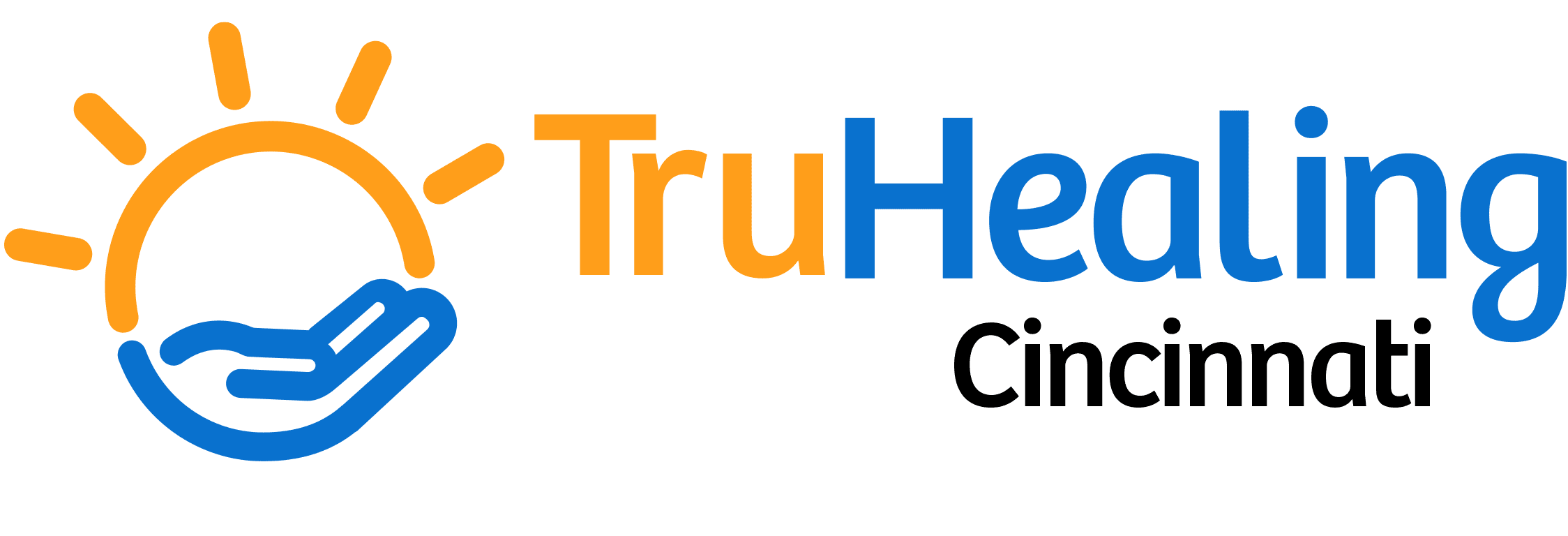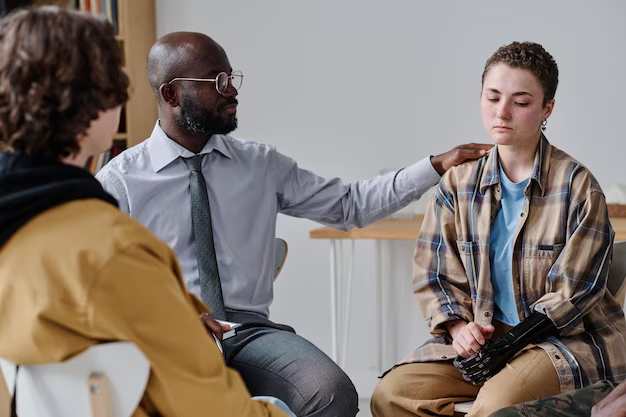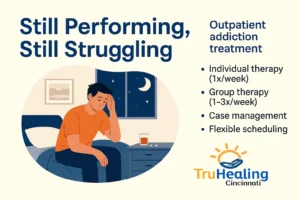You’re still showing up.
Emails answered. Projects finished. Family cared for. You might even be hitting the gym, volunteering, making plans for the weekend. You’re still “on.”
But at night—when the day finally goes quiet—something inside you whispers a different truth.
Maybe it’s a drink you didn’t plan to have. Or a pill you told yourself you were done with. Or the sense that, no matter how much you do, you can’t feel anything but empty.
You’re not spiraling. But you’re not okay.
And you wonder, quietly, if maybe it’s time to get help—without anyone knowing. Without walking away from your life. Without calling it a crisis.
This is where outpatient addiction treatment comes in.
If you’ve been silently wondering what it actually looks like, this is for you.
You Don’t Have to Lose Everything to Begin
We see it every day: high-functioning adults who are doing “just fine” by most measures—but who are barely hanging on emotionally.
Many of them are parents, healthcare professionals, business owners, teachers. They haven’t hit a “rock bottom.” They’re not in visible distress.
But they’re drinking more than they used to. Or using something to get through the day. Or just feeling numb, detached, burned out, and afraid it’s starting to show.
You don’t need to be falling apart to get help. You just need to be honest enough to admit you’re tired of hiding.
That’s enough.
What Is Outpatient Addiction Treatment, Really?
Outpatient addiction treatment is a flexible, structured approach to healing substance use without requiring you to leave your job, your family, or your daily life.
At TruHealing Cincinnati, we offer outpatient care to people who still need to “keep going”—but can’t keep doing it alone.
It includes:
- Individual therapy (typically once per week)
- Group therapy (1–3 times per week, depending on intensity)
- Case management to help with work, family, or legal concerns
- Medication-assisted treatment if needed (and if appropriate)
- A flexible schedule—daytime or evening—to fit your real life
It’s not a downgrade from inpatient. It’s a different model—built for people who aren’t ready (or able) to pause their lives, but still want real, meaningful change.
You Keep Your Life—But Start Feeling It Again
The biggest surprise for most people in outpatient care?
You don’t have to blow up your life to feel better.
You’ll still go to work. Still take care of your family. Still get dinner on the table or present at that 9 a.m. meeting. But instead of carrying the secret weight of it all alone, you’ll finally have a place where you don’t have to pretend.
Over time, you may notice things shift:
- The cravings start to fade.
- You sleep more deeply.
- You have words for feelings you used to numb.
- You stop dreading the quiet.
This isn’t overnight magic. It’s slow, steady, human work. And you’ll be surrounded by people who understand—many of whom are living in that same “still-functioning-but-struggling” space.
No, You Don’t Have to Explain Yourself
Outpatient care isn’t about labels. No one’s going to make you call yourself anything you’re not ready for.
You can walk in and say:
- “I don’t know if I’m addicted—but I’m scared.”
- “I think I’m using more than I’m okay with.”
- “I’m still doing everything I need to do—but I feel like I’m about to break.”
That’s more than enough.
Your story doesn’t need to be dramatic. It just needs to be real.
Group Isn’t What You Think It Is
Let’s get this out of the way: most people feel awkward about group therapy before they try it. That’s normal.
What we’ve seen, though, is that group quickly becomes the place where people breathe for the first time all week.
You don’t have to share everything. You don’t have to talk if you don’t want to. But being in a room where no one’s performing—where everyone’s just telling the truth—is its own kind of relief.
And if you’re used to being the one who holds it together for everyone else? Group becomes a space where you don’t have to.
Privacy Is Built In
Many of our outpatient clients live here in Cincinnati. But we also work with people looking for outpatient addiction treatment in Lawrenceburg, Lexington, and Louisville who need professional help without public exposure.
Your care is protected by federal privacy laws. Your employer doesn’t need to know. Your family doesn’t need to know—unless you want them to.
Most clients schedule sessions around work or personal responsibilities. And some even begin their healing while still in full-blown professional roles.
We’ve had clients who are physicians, lawyers, educators, CEOs, stay-at-home parents. What they all share is the same quiet ache—and the courage to ask for help before it becomes a crisis.
This Is What Change Looks Like
It’s not cinematic. No sweeping music or dramatic breakthroughs.
Most of the time, it’s a Tuesday night group session where you tell the truth for the first time. Or a quiet Saturday morning when you realize you didn’t need a drink to relax. Or a stressful week where you chose support over silence.
And bit by bit, it adds up. Until you’re not just functioning anymore—you’re actually okay.
FAQs: Outpatient Addiction Treatment
Is outpatient treatment as effective as inpatient?
For the right person, yes. If you’re medically stable, able to function day-to-day, and committed to showing up, outpatient care can be just as effective—especially long-term.
How many hours per week does it take?
It depends on the level of care. Standard outpatient might involve 2–4 hours per week. Intensive outpatient (IOP) can require 9–12 hours. Your schedule will be tailored to your needs and availability.
Do I have to stop working?
No. Outpatient treatment is designed so you can stay engaged in your daily responsibilities while receiving care. Most sessions can be scheduled around your workday.
What if I don’t think I’m “addicted”?
That’s okay. If your substance use is causing distress, isolation, or fear—even if you’re still functioning—it’s worth paying attention to. You don’t need a label to begin.
Can I stay at home during treatment?
Yes. That’s the core benefit of outpatient treatment. You stay in your environment, with the people you love, while getting the support you need.
Will people find out?
Not unless you tell them. Your treatment is confidential, and most clients schedule sessions around their existing routines without disclosing anything to others.
Final Word: You Don’t Have to Wait for a Breakdown
If your life looks fine but feels unsustainable—you’re not the only one.
Outpatient addiction treatment is real help for people who are still holding it together, but don’t want to keep living on the edge of burnout or emotional collapse.
You don’t have to step away from your life to heal.
You just have to be willing to start.
Call (888) 643-9118 to learn how outpatient care at TruHealing Cincinnati can support the version of you that’s tired of pretending and ready for something real.


